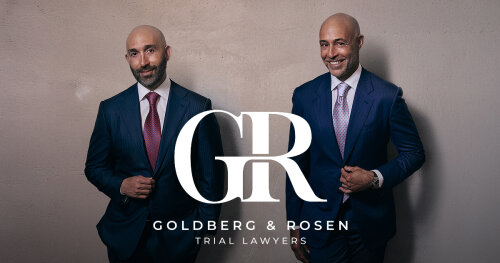Best Class Action Lawyers in Florida
Share your needs with us, get contacted by law firms.
Free. Takes 2 min.
Or refine your search by selecting a city:
List of the best lawyers in Florida, United States
About Class Action Law in Florida, United States
Class action law allows a group of people with similar legal claims to bring a single lawsuit against a defendant. In Florida, class action suits are often used when a large number of individuals have been harmed by the actions of a company, government agency, or other entity. By combining their claims, plaintiffs can seek justice more efficiently and make legal proceedings more manageable. Florida follows both state and federal rules for class actions, and these cases can be complex due to the number of parties and issues involved.
Why You May Need a Lawyer
Individuals may need a lawyer experienced in class action law in Florida for several reasons. If you have been harmed by defective products, deceptive business practices, consumer fraud, violations of employee rights, or faulty financial services, your case could be part of a class action. A lawyer can help you determine whether your claims are suitable for a class action suit, represent your interests in court, negotiate settlements, and ensure you understand your rights and potential compensation. Since class actions involve many legal intricacies and strict procedural requirements, having professional legal guidance is crucial.
Local Laws Overview
Class action lawsuits in Florida are governed by both the Florida Rules of Civil Procedure and, when filed in federal court, the Federal Rules of Civil Procedure, specifically Rule 23. Key aspects specific to Florida include the requirements for class certification, which ensure that claims are sufficiently similar to warrant group litigation. Florida law requires the identification of a class representative, demonstration of commonality among claims, adequacy of representation, and a finding that a class action is the best method for resolving the dispute. The court plays an active role by reviewing settlements, notifying potential members, and ensuring fairness throughout the process. Furthermore, Florida has statutes and case law that affect the types of claims that can be brought as class actions, timelines for filing, and requirements for damages or relief.
Frequently Asked Questions
What is a class action lawsuit?
A class action lawsuit is a legal case brought by one or more individuals on behalf of a larger group, all of whom have similar claims against the same defendant. It allows many people to jointly pursue justice and compensation.
How do I know if I am part of a class action in Florida?
You will usually be notified if you are a potential member of a class, either through mail, email, or public notices. Notification provides details about the lawsuit and your rights, including how to participate or opt out.
What kinds of issues can be addressed through a class action in Florida?
Common issues include defective products, consumer fraud, environmental harm, financial misconduct, employment violations, and false advertising, among others.
Do I have to pay for legal representation in a class action?
Generally, class action lawyers work on a contingency fee basis, meaning they only get paid if the lawsuit is successful. Attorney fees are usually paid from any settlement or award.
What are the benefits of joining a class action instead of filing individually?
By joining a class action, individuals can pool resources, share legal costs, and benefit from collective strength, often making it possible to pursue claims that might be too costly to litigate alone.
How long does a class action case take in Florida?
Class action cases can take several months or even years to resolve due to the complexities of group litigation, the need to inform class members, and the possibility of appeals.
What is required to certify a class in Florida?
Certification requires proof that there is a clear class of people with similar claims, adequate representation by the lead plaintiff and attorney, and that a class action is the most efficient way to handle the dispute.
Can I opt out of a class action in Florida?
Yes. If you receive notice of a class action, you usually have the option to opt out, which means you will not be bound by any outcome and may choose to file your own lawsuit.
What kind of compensation can I receive from a class action?
Compensation varies depending on the case but can include monetary damages, repairs, replacements, refunds, or changes in business practices or company policies.
What should I do if I believe I have a claim suitable for a class action?
Consult an attorney experienced in class action law. They can assess your situation, explain your options, and guide you through the legal process from start to finish.
Additional Resources
People seeking assistance or information about class action lawsuits in Florida can contact or consult with the following resources:
- Florida Bar Association - Lawyer Referral Service
- Florida State Courts Self-Help Center
- United States District Courts for the Northern, Middle, and Southern Districts of Florida
- Legal Aid Societies and local legal clinics
- Consumer Protection Division of the Florida Attorney General's Office
Next Steps
If you believe you have been affected by widespread misconduct or share a legal issue with a broader group, consider gathering any relevant documents and details about your situation. Contact a qualified class action attorney in your area to discuss your potential claim. Be prepared to provide information about the harm you suffered, communications you have received, and any other evidence related to your case. Your lawyer can investigate the matter, determine if a class action is appropriate, and help you take the necessary legal steps. If you receive notification of an existing class action, carefully review your options and deadlines for participation or opting out. Taking prompt action will help ensure that your rights are protected.
Lawzana helps you find the best lawyers and law firms in Florida through a curated and pre-screened list of qualified legal professionals. Our platform offers rankings and detailed profiles of attorneys and law firms, allowing you to compare based on practice areas, including Class Action, experience, and client feedback.
Each profile includes a description of the firm's areas of practice, client reviews, team members and partners, year of establishment, spoken languages, office locations, contact information, social media presence, and any published articles or resources. Most firms on our platform speak English and are experienced in both local and international legal matters.
Get a quote from top-rated law firms in Florida, United States — quickly, securely, and without unnecessary hassle.
Disclaimer:
The information provided on this page is for general informational purposes only and does not constitute legal advice. While we strive to ensure the accuracy and relevance of the content, legal information may change over time, and interpretations of the law can vary. You should always consult with a qualified legal professional for advice specific to your situation.
We disclaim all liability for actions taken or not taken based on the content of this page. If you believe any information is incorrect or outdated, please contact us, and we will review and update it where appropriate.
Browse class action law firms by city in Florida
Refine your search by selecting a city.
















